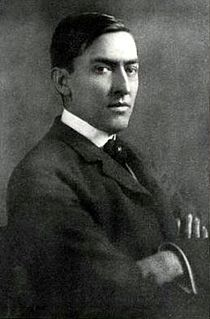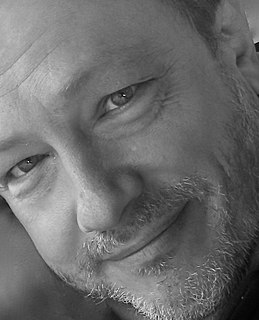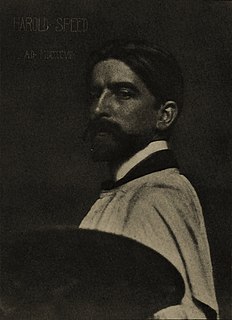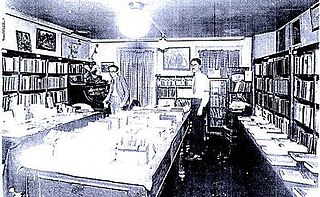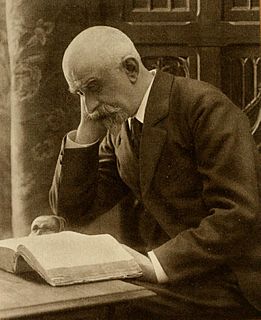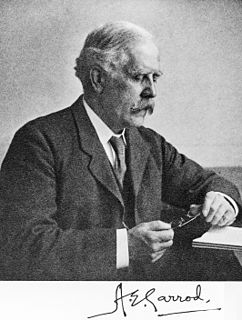Top 885 Acquired Quotes & Sayings - Page 15
Explore popular Acquired quotes.
Last updated on April 16, 2025.
The classics of Marxism talked of communism as a society to which a modern society should aspire, a society truly fair, where the relations of monetary exchange were not the priority but one wher the people's needs could be satisfied, and where people would not be worth more according to how much monetary wealth they acquired. Instead their value would be based on their contribution to society as a whole. It would be a society without class that would accept people based on their capabilities and their potential to contribute to that society.
We will not wish we had made more money, acquired more stuff, lived more comfortably, taken more vacations, watched more television, pursued greater retirement, or been more successful in the eyes of this world. Instead, we will wish we had given more of ourselves to living for the day when every nation, tribe, people, and language will bow around the throne and sing the praises of the Savior who delights in radical obedience and the God who deserves eternal worship.
The more I study nature, the more I become impressed with ever-increasing force with the conclusion, that the contrivances and beautiful adaptations slowly acquired through each part occasionally varying in a slight degree but in many ways, with the preservation or natural selection of those variations which are beneficial to the organism under the complex and ever-varying conditions of life, transcend in an incomparable degree the contrivances and adaptations which the most fertile imagination of man could suggest with unlimited time at his disposal.
For African American children, in particular, the odds are extremely high that they will have a parent or loved one, a relative, who has either spent time behind bars or who has acquired a criminal record and thus is part of the under-caste - the group of people who can be legally discriminated against for the rest of their lives. For many African American children, their fathers, and increasingly their mothers, are behind bars. It is very difficult for them to visit. Many people are held hundreds or even thousands of miles away from home.
Conscience is the voice of the soul, the passions are the voice of the body. Is it astonishing that often these two languages contradict each other, and then to which must we listen? Too often reason deceives us; we have only too much acquired the right of refusing to listen to it; but conscience never deceives us; it is the true guide of man; it is to man what instinct is to the body; which follows it, obeys nature, and never is afraid of going astray.
But just as it sometimes happens that the most temperate people, who have never acquired the habit of drinking alcohol, or even a taste for it, are tormented by the fear that somehow or other they will one day find themselves drunk, so Isabelle perpetually feared that she might be betrayed into an impulsive act that was destructive to such order as reason had imposed on life. Therefore she was forever running her faculty of analysis over in her mind with the preposterous zeal of an adolescent running a razor over his beardless chin.
I got the breaks. Starting from nowhere in the corn belt, I helped edit a country weekly, then was jack-of-all-departments on an obscure daily, so that when I arrived in a big city everything I tackled in the line of column conducting and syndicate peddling and playwriting had to bring promotion, because I had no social standing which could be endangered, no reputation to toss away and no pride which might suffer a setback. Everything I acquired had to be velvet. You cannot lose your silver spoon if you are brought up on pewter.
Why does a woman carry a gun? Because, under our system, every citizen has the latitude to act in the absence of police; the latitude to act reasonably, to act immediately, to act in defense of self, to act in defense of another, to act with lethal force, to act with her acquired training and to act not in anger but to respond in purpose. To exercise the protections of that latitude in public policy, public interest and practical safety, all that is demanded of her is that she act reasonably under the circumstances.
There is a distinction between failing and being a failure. Few things are learned in life without failing at least once. Did you learn to roller skate without falling a few times? Did you learn to ride a bike without losing your balance? Chances are you didn't. You may have wanted to do those things so intensely that you quickly put unsuccessful attempts behind you and kept trying. Soon you acquired the skill to do the thing you wanted. Even though in the process of learning you may have failed many times, you were not a failure. "Failing" simply became an open door to try again.
I want everyone to keep the property that he has acquired for himself according to the principle: benefit to the community precedes benefit to the individual. But the state should retain supervision and each property owner should consider himself appointed by the state. It is his duty not to use his property against the interests of others among his own people. This is the crucial matter. The Third Reich will always retain its right to control the owners of property.
My father was a very good amateur pianist, and he had a collection of books on technique. One of the things he had was a small volume of exercises by Rudolf Ganz, in which Ganz mentions the pedagogical work of the Swiss composer, Émile-Robert Blanchet, who wrote a ton of polyphonic exercises for one-hand. These exercises were a great help for finger independence, which I acquired early on. This might have given me somewhat of an edge, a facility to be able to knock any obstacle that was in my way.
Just as women supplement men in private life, so they will supplement men in public life by concentrating their organized efforts on those objects which men are likely to ignore. There is a tremendous field for women as active protagonists of new ideas and new methods of political and social housekeeping. When organized and conscious of their power to influence their surroundings, women can use their newly acquired freedom in a great many ways to mold the world into a better place to live in.
By the end of the 1960s, the United States owned more than half of the Indian rupee money supply, and that had been acquired through food aid. So I think it's very interesting to see the very long history of how sovereignty and food go together. When some countries remove another country's ability to feed itself, it is a very powerful tool. Imperialist countries, like the United Kingdom, like the United States, have used it for centuries.
I see young men, my townsmen, whose misfortune it is to have inherited farms, houses, barns, cattle, and farming tools; for these are more easily acquired than got rid of. Better if they had been born in the open pasture and suckled by a wolf, that they might have seen with clearer eyes what field they were called to labor in. Who made them serfs of the soil? Why should they eat their sixty acres, when man is condemned to eat only his peck of dirt? Why should they begin digging their graves as soon as they are born?
Bernard [Leach] had acquired many [Shoji] Hamada works. Some of them, it was interesting - first of all, Hamada worked in St. Ives for about four years before returning to Japan to start his own pottery. He had exhibitions in London, and if these exhibitions didn't sell out, the galleries were instructed to send the remaining work down to the Leach Pottery, where they would go into the showroom for sale. If Bernard saw one that hadn't sold that he really admired, then he would take it (he would buy it), and it would go into the house.
.. since it was true that study, even when done properly, can only teach us what wisdom, right conduct and determination consist in, they wanted to put their children directly in touch with actual cases, teaching them not by hearsay but by actively assaying them, vigorously molding and forming them not merely by word and precept but chiefly by deeds and examples, so that wisdom should not be something which the soul knows but the soul's very essence and temperament, not something acquired but a natural property.
Many older wealthy families have learned to instill a sense of public service in their offspring. But newly affluent middle-classparents have not acquired this skill. We are using our children as symbols of leisure-class standing without building in safeguards against an overweening sense of entitlement--a sense of entitlement that may incline some young people more toward the good life than toward the hard work that, for most of us, makes the good life possible.
When I saw photographs of children murdered by the Fascist, I felt furious pity. When the supporters of Franco talked of Red atrocities, I merely felt indignant that people should tell such lies. In the first case I saw corpses, in the second only words. . . I gradually acquired a certain horror of the way in which my own mind worked. It was clear to me that unless I cared about every murdered child impartially, I did not really care about children being murdered at all.
Whether I like it or not, most of my images of what various historical periods feel, smell, or sound like were acquired well before I set foot in any history class. They came from Margaret Mitchell, from Anya Seton, from M.M. Kaye, and a host of other authors, in their crackly plastic library bindings. Whether historians acknowledge it or not, scholarly history’s illegitimate cousin, the historical novel, plays a profound role in shaping widely held conceptions of historical realities.
O sancta simplicitas! What strange simplification and falsification mankind lives on! One can never cease to marvel once one has acquired eyes for this marvel! How we have made everything around us bright and free and easy and simple! How we have known how to bestow on our senses a passport to everything superficial, on our thoughts a divine desire for wanton gambling and false conclusions! - how we have from the very beginning understood how to retain our ignorance so as to enjoy an almost inconceivable freedom, frivolity, impetuosity, bravery, cheerfulness of life, so as to enjoy life!
His epitaph: This tomb hold Diophantus, Ah, what a marvel! And the tomb tells scientifically the measure of his life. God vouchsafed that he should be a boy for the sixth part of his life; when a twelfth was added, his cheeks acquired a beard; He kindled for him the light of marriage after a seventh, and in the fifth year after his marriage He granted him a son. Alas! late-begotten and miserable child, when he had reached the measure of half his father's life, the chill grave took him. After consoling his grief by this science of numbers for four years, he reached the end of his life.
The object of your training in drawing should be to develop to the uttermost the observation of form and all that it signifies, and your powers of accurately portraying this on paper.
Let painstaking accuracy be your aim for a long time. When your eye and hand have acquired the power of seeing and expressing on paper with some degree of accuracy what you see, you will find facility and quickness of execution will come of their own accord.
Unflinching honesty must be observed in all your studies. It is only then that the ‘you’ in you will eventually find expression in your work.
Even when your body does nothing, sin can be active in your mind. When your soul inwardly repulses the evil one's attack by means of prayer, attention, remembrance of death, godly sorrow and mourning the body, too, takes its share of holiness, having acquired freedom from evil actions. This is what the Lord meant by saying that someone who cleans the outside of the cup has not cleansed it inside, but clean the inside and the whole cup will be clean
Fasts and vigils, the study of Scripture, renouncing possessions and everything worldly are not in themselves perfection, as we have said; theyare its tools. For perfection is not to be found in them; it is acquired through them. It is useless, therefore, to boast of our fasting, vigils, poverty, and reading of Scripture when we have not achieved the love of God and our fellow men. Whoever has achieved love has God within himself and his intellect is always with God.
She wasn't ready to settle down, she told her friends. That was one way of putting it. Another was would have been that she had not found anyone to settle down with. There had been several men in her life, but they hadn't been convincing. They'd been somewhat like her table - quickly acquired, brightened up a little, but temporary. The time for that kind of thing was running out, however. She was tired of renting.
Not to find one's way around a city does not mean much. But to lose one's way in a city, as one loses one's way in a forest, requires some schooling. Street names must speak to the urban wanderer like the snapping of dry twigs, and little streets in the heart of the city must reflect the times of day, for him, as clearly as a mountain valley. This art I acquired rather late in life; it fulfilled a dream, of which the first traces were labyrinths on the blotting papers in my school notebooks.
... those who sit in the darkness of passions and whose minds are blinded by ignorance, or, rather, those who have not acquired the 'mind of Christ' (I Cor. 2:16), think that he who has the mind of Christ is foolish, and that he who has it not is sensible. Of these the prophet David rightly states, 'The ignorant and foolish perish together' (Ps. 49:11). Therefore such men twist the whole of Scripture according to their own desires (cf. II Pet. 3:3, 16) and corrupt themselves in their own passions. But it is not divine Scripture that suffers from this, but those who disfigure it!
Often low-income parents give their children every other thing they need for successful participation in school and the world of work except the planning and organizing skills and habit patterns needed to operate in complex settings. Many intelligent and able college students from low-income backgrounds confront these deficits when faced with a heavy assignment load. . . . These patterns are best acquired at an early age and need to be quite well developed by late elementary school or twelve or thirteen years of age.
America is full of businesses bearing old Christian names, but which are really owned and run by Jews. Most of them have been acquired in the manner I have just described, the way the Jew creates something out of nothing (slow strangling). The Jew, better than anyone else in the world knows how to dispossess the poor and the members of the middle classes. To fit this case, the old P.T. Barnum adage needs only a little changing. A gentile enters business every minute, with two Jews waiting to take him out of it.
The Socratic maxim that the recognition of our ignorance is the beginning of wisdom has profound significance for our understanding of society. Most of the advantages of social life, especially in the more advanced forms that we call "civilization" rest on the fact that the individual benefits from more knowledge than he is aware of. It might be said that civilization begins when the individual in the pursuit of his ends can make use of more knowledge than he has himself acquired and when he can transcend the boundaries of his ignorance by profiting from knowledge he does not himself possess.
I'm kind of a creature of the alt-weekly universe - my real education into higher culture was acquired in coffee shops, reading those papers, digging into that lively mishmash of opinion for drift, a sense of what to see, what to hear, what to read, etc. - and I'd like to think that scene's still vital, although I understand there's been a fair amount of conglomerating, which would seem to undercut its radical roots, its funky local flavor. I'd encourage any writer with an eye for life and an ear for prose to give it a try. You can work out your chops just fine in newsprint.
...liberation from constraints that operate at the level of ordinary humanity---limits imposed by space and time, by the needs of the body, and by the opaqueness of the computer-like mind. All three examples [Jacob Lorber, Edgar Cayce, and Therese Neumann] illustrates the paradoxical truth that such 'higher powers' cannot be acquired by any kind of attack or conquest conducted by the human personality; only when the striving for 'power' has entirely ceased and been replaced by a certain transcendental longing, often called the love of God, may they, or may they not be 'added unto you.
In this game he had acquired a great deal of muddled knowledge, more than one approximation and less than one certitude. And absence of energy, a curiosity that was too sharp to be crushed immediately, a lack of order in his ideas, a weakening of his spiritual boundaries, which were promptly twisted, an excessive passion for running along forked roads and wearying of the path as soon as he had started on it, mental indigestion demanding varied dishes, quickly tiring of the foods he desired, digesting almost all, but badly, was his state.
I have learned from experience that happiness is an acquired skill. Children are one of the greatest lessons in happiness, constantly challenging us to enjoy the moment, as the next one will not be the same. Gratitude is essential to happiness. Every time our children rush up to us and smile, we have something to be happy about; every time we get out of bed and can take a deep breath and go out for a walk, we have something to be happy about-that is the essence of a happy existence. Happiness is a muscle we must use, or it will wither away.
Consider the generosity of our Savior: what He acquired by dying becomes ours by eating. As often as we receive this Sacrament with proper dispositions, we make our own the fruits of all the labors, injuries and sufferings of His life, especially those borne at the time of His passion and death. Just as the power and the sensations of the head reach all the members of the body, in the same way, because Christ is "the head of the Church which is His Body" (Eph. 1:23), the treasures of His grace are made abundantly available to all who through charity are one with Him as living members.
What vast additions to the conveniences and comforts of living might mankind have acquired, if the money spent in wars had been employed in works of public utility; what an extension of agriculture even to the tops of our mountains; what rivers rendered navigable, or joined by canals; what bridges, aqueducts, new roads, and other public works, edifices, and improvements might not have been obtained by spending those millions in doing good, which in the last war have been spent in doing mischief.
The Master said, "Wealth and honor are things that all people desire, and yet unless they are acquired in the proper way I will not abide them. Poverty and disgrace are things that all people hate, and yet unless they are avoided in the proper way I will not despise them. If the gentleman abandons ren, how can he be worthy of that name? The gentleman does not violate ren even for the amount of time required to eat a meal. Even in times of urgency or distress, he does not depart from it."
Historical refutation as the definitive refutation.- In former times, one sought to prove that there is no God - today one indicates how the belief that there is a God arose and how this belief acquired its weight and importance: a counter-proof that there is no God thereby becomes superfluous.- When in former times one had refuted the 'proofs of the existence of God' put forward, there always remained the doubt whether better proofs might not be adduced than those just refuted: in those days atheists did not know how to make a clean sweep.
Nevertheless, scientific method is not the same as the scientific spirit. The scientific spirit does not rest content with applying that which is already known, but is a restless spirit, ever pressing forward towards the regions of the unknown, and endeavouring to lay under contribution for the special purpose in hand the knowledge acquired in all portions of the wide field of exact science. Lastly, it acts as a check, as well as a stimulus, sifting the value of the evidence, and rejecting that which is worthless, and restraining too eager flights of the imagination and too hasty conclusions.
Perhaps the most significant thing a person can know about himself is to understand his own system of values. Almost every thing we do is a reflection of our own personal value system. What do we mean by values? Our values are what we want out of life. No one is born with a set of values. Except for our basic physiological needs such as air, water, and food, most of our values are acquired after birth.
The entire history of humanity is marked by a single inexorable movement - from animal instinct toward rational thought, from inborn behavior toward acquired knowledge. A half-grown panther abandoned in the wilderness will grow up to be a perfectly normal panther. But a half-grown child similarly abandoned will grow up into an unrecognizable savage, unfit for normal society. Yet there are those who insist the opposite: that we are creatures of instinct, like wolves.
The important thing is not so much that every child should be taught, as that every child should have the opportunity of teaching itself. What does it matter if the pupil know a little more or a little less? A boy who leaves school knowing much, but hating his lessons, will soon have forgotten all he ever learned; while another who had acquired a thirst for knowledge, even if he had learned little, would soon teach himself more than the first ever knew.
Of course you can more easily recognise the outsiders because they have a different skin color. But let us take for instance the relationship between the White Anglo-Saxon Protestant majority in America and the negroes. What is important here is that the negroes were the descendants from slaves and were excluded from power, while the white majority kept them at bay, kept them down, kept them where they are. If the negroes in the future became assimilated and acquired equal power access, if there were a black president, then many of these things would change.
Your medical documents will say Acquired Immune Deficiency Syndrome that is AIDS. What that means you have got this challenge of immune deficiency. Alright what causes immune deficiency? HIV. Alright. Is that all that causes immune deficiency? The medical textbooks will say there are other things that cause immune deficiency. There is also genetic immune deficiency that is a different phenomenon.
Do not talk about giftedness, inborn talents! One can assume great men of all kinds who were very little gifted. They acquired greatness, became “geniuses” (as we put it), through qualities the lack of which no one who knew what they were would boast of: they all possessed that seriousness of the efficient workman which first learns to construct the parts properly before it ventures to fashion a great whole; they allowed themselves time for it, because they took more pleasure in making the little, secondary things well than in the effect of a dazzling whole.






